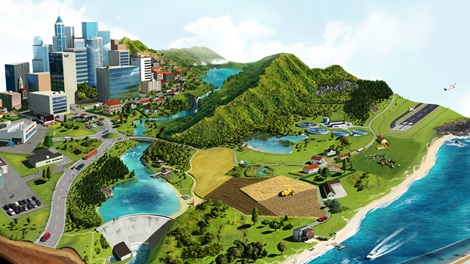
Saving the local river from continuous contamination, reusing treated water and its by-products, all while securing a sustainable future for Mardin and its residents are the humble tasks of our new and innovative wastewater treatment plants
By Mr. Omer Ozkan, plant project director
The City of Mardin lies in the heart of the Mesopotamian plate, which has a history going back more than 12,000 years, more specifically to the Neolithic age. The city has a very interesting architectural style; The houses in the city centre are carved in the mountain sides, and transportation in this part of the city is allowed only by donkey and cart.
Ancient settings with modern perspectives
For the past 1,500 years, Mardin has nourished residents of Armenian, Kurdish, Jewish, Arabic and Turkish origin. Being a main stop on the Silk Road, an ancient network of trade routes, the city is open to many cultures. It hosts temples and buildings from the Babylon, Persian, Byzantine and Ottoman era, and today serves as an open air museum. Mardin is famous for its silver workmanship and temples, but the use of wastewater management was not prioritised until recently. Before this, the wastewater of the city was simply discharged into the Zergan river. With the help of an European Union led IPA fund (the Instrument for the Pre-Accession Assistance), the Mardin Municipality then invested in our two state-of-the-art wastewater treatment plants for the city.


48 kilometres of benefits
The construction of two wastewater treatment plants, and of 48 kilometres of wastewater transmission lines, were then initiated with Mass Treatment Systems as contractor. The plants will serve 613,000 people, and will enable the reuse of 46,5 million cubic metres of water in irrigation.
These modern plants are serving multiple purposes at the same time. They are designed with integrated electricity generation units using methane to reduce carbon emission, and the treated water will be released through the Zergan river to recover the riverbed’s natural habitat.
Mardin will benefit from the wastewater management investment in four remarkable ways:
- the city’s wastewater is now treated, and the contamination of the Mesopotamian plate stopped,
- the treated water will be used for irrigation and agricultural development of cotton fields in the plain,
- resulting sludge from the treatment process will then be used as fertiliser and fuel for cement plants, and
- the current odour problem related to the contamination in the region will be minimised.
Additionally, working towards these benefits will create new job opportunities in the area, help reduce migration to metropolitan cities, and will promote development in the city of Mardin.
AVK at our assistance
In every section of both wastewater treatment plants, AVK were our preferred supplier of valves. The valve scope is diverse, ranging from gate valves for wastewater, to actuator mounted butterfly valves in process control, and high-temperature rated butterfly valves for aeration lines. For both plants, the contractor's obligation has been further extended to include operation of the plants for the next five years, and Mass Treatment Systems were happy to choose AVK due to the wastewater approvals, durability and long lifetime of the products.

AVK solutions
Learn more about our ways of assisting in efficient wastewater projects.
GO TO WASTEWATER